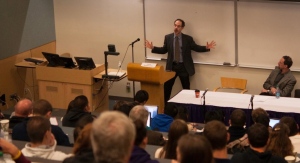A man for all reasons
March 13, 2013 3 Comments
“Most of all, Madison loved the conversation,” David Waldstreicher told a capacity crowd during a lecture, “Madison, Slavery and the Constitution,” Wednesday evening.
President James Madison was a man of contrasts and conflicts, a man who was impossible to categorize, but who balanced ideas and competing interests with a dogged determination to find workable solutions. He was a man of complexity, compromise and pragmatism — a man for all reasons.
Professor Waldstreicher, a historian of early and 19th century America and member of the faculty of Temple University, delivered the lecture as part of JMU’s Inauguration Week. His lecture and Tuesday’s lecture on Dolley Madison by University of Virginia scholar Holly Schulman were sponsored by the Rocco Forum.
Madison clearly had moral objections to slavery, Waldstreicher said. It was clear from his writings that he “had the ability to see slaves’ nature.” Yet Madison was a realist who understood that the institution of slavery was so deeply woven into the country’s fabric that removing it was difficult, and in the end, impossible during Madison’s era.
Slavery was a moral problem with complicated ties to the individual states’ economic systems, social institutions and political frameworks. Would slaves, for instance, equate to more representation? Or more taxation? Different states and statesmen approached with widely differing perspectives. Madison, however, saw the need to balance competing interests. Majority rights vs. minority rights. Slave states vs. non-slave states. States’ rights vs. federal interests.
In navigating these complex issues required to untangle the institution of slavery from the societies and interests with which it was inextricably entwined, Madison excelled. He understood that slavery was “not just a moral problem, but a political problem.”
For instance, Waldstreicher said, in crafting the Constitution, the slavery clause was “a necessary evil” and the three-fifths clause (the measure to count slaves, which Madison proposed in March, 1783) was “the best that could be done.” Neither perfect — nor a step backward. Madison’s great talent was the ability to seek the necessary and the attainable over the perfect and impossible. Waldstreicher said, “The Constitution’s values are Madison’s values.”
When the Constitution was completed, it was an imperfect document that neither solved slavery nor preserved it forever. “In the end, I think,” Waldstreicher said, “Madison was comfortable with that.”
Waldstreicher also said that the failure of the Constitution to end slavery probably led to the Civil War, yet during Madison’s era the compromises struck were sufficient so that “in his lifetime, the center did hold.” It was enough for the time.
While Madison is often called the Father of the Constitution, Waldstreicher said that is too simple. The Constitution, after all, was hammered out through political wrangling, debate and compromise — a difficult, complex process mixing serious and volatile issues. Success required creativity of thought and vision, both Madison’s great strengths.
It was Madison’s ability to see all sides of issues and to reason for the good of the nation that is his great legacy. Madison, the politician and the pragmatist, was always interested in the inquiry — and what better exemplar is there for a university.



Pingback: March 16 – Happy birthday James Madison, “Father of the Constitution” | Mr. Darrell's Wayback Machine
It was fascinating! It made me think about the value and pragmatism of incremental change.
LikeLike
Oh, I wish I could have been there to hear that lecture. Sounds fascinating.
LikeLike